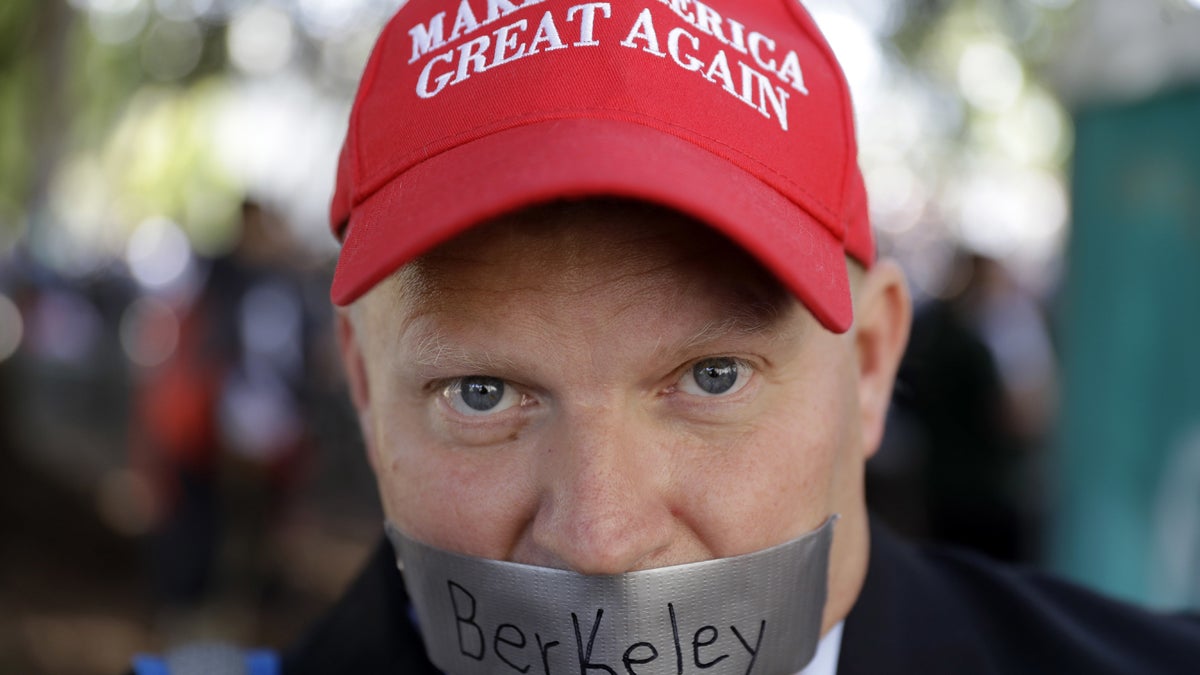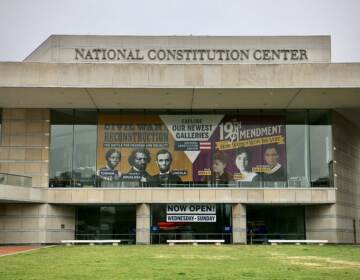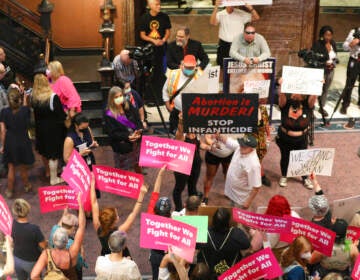The good, the bad, and the ugly of free speech

Daryl Tempesta is shown with tape over his mouth in protest in April, in Berkeley, Calif. Demonstrators gathered near the University of California, Berkeley campus amid a strong police presence and rallied to show support for free speech and condemn the views of Ann Coulter and her supporters. (AP Photo/Marcio Jose Sanchez, file)
Free speech is easy to support when you like what’s being said, but that’s not how the First Amendment works. This is something Americans should know, but appear to have forgotten, according to Floyd Abrams, who spoke recently at the National Constitution Center.
Abrams, a preeminent First Amendment attorney, has been involved in most of the prominent free speech litigation over the last 50 years. From defending the New York Times in the 1971 Pentagon Papers case to Citizens United in 2010, Abrams has argued often before the Supreme Court, always on the side of greater expression. At the NCC, he used his recent book, “The Soul of the First Amendment,” as a starting point to survey the current state of free speech.
Citizens United rationale: Speech is speech
I wasn’t the only one in the capacity crowd who recoiled at learning Abrams had assisted in successfully arguing Citizens United. He seems used to the reaction, and explained his reasoning. Abrams believes that government should not limit any political speech, whether it comes from an individual or a corporation, provided the source is identified. In his view, restricting speech is far more dangerous than permitting it.
The argument is familiar, and persuasive. Yet it still seems that Citizens United made it easier for those with money to drown out the expression of those without it. Needing more convincing, I found a 2015 lecture Abrams delivered at Temple University’s Beasley School of Law. In discussing Citizens United there, he cited prior cases involving First Amendment claims by corporate plaintiffs. In one, during the Clinton administration, Barnes and Noble challenged a subpoena to release a list of books purchased by Monica Lewinsky. In another, the Brooklyn Museum fought then-New York Mayor Rudy Giuliani, who wanted to shut down an offensive art exhibit.
Since First Amendment protections for corporate entities had not been questioned in those cases, Abrams reasoned, Citizens United deserved the same treatment. Which makes sense, but fails to address the imbalance in access and influence wielded by corporations, wealthy individuals, and groups in pressing their singular agendas, often to the detriment of the rest of us.
Abrams acknowledged the problem, distinguishing between limiting political spending, which he thinks appropriate, and limiting political speech. If only serious campaign finance reform could be enacted and enforced. Right now, that’s unlikely.
Campuses choose peace over expression
Abrams pointed out that the First Amendment applies only to the government and its “instrumentalities,” something I had not known.
So it covers state universities, but not private colleges, where recent controversies have erupted with regard to outside speakers being invited, and then disinvited, to campus. A range of justifications have been given, from disturbing students’ delicate sensibilities to security.
Which is quite a turnaround for anyone who remembers college campuses in the 1960s, when confrontation was practically listed in the course catalog. Students took over buildings and walked out of graduations — not that those are the best methods of expression — but neither is the intellectual timidity that declares campuses safe zones in which seldom is heard a discouraging word.
“Campuses should be the most protective to the broadest level of freedom of speech …” Abrams said in 2015. “It seems to me that pressures on free expression and the suppression of speech do not come from outside [colleges and universities] but from within, much of it from a minority of students who strenuously, and I think contemptuously, disapprove of the views of speakers … and will not tolerate the expression of views on their campuses with which they disagree.”
College used to be where young people sought enlightenment, which requires being exposed to a vast range of information, including views and theories you may not like, agree with, or want to think about. That’s the process. State-related or not, Abrams believes that the spirit of the First Amendment should prevail at all institutions of higher learning, and that security concerns should not become an excuse to bar speakers: “The way to respond is to answer the offensive speech, or to protest the speech, or heckle the speaker.”
The right to be forgotten
Contrasting the United States with Europe, Abrams discussed the tension between free speech and the “right to be forgotten,” unfamiliar to Americans, but recognized by European courts.
The right is based in the idea that a private person who becomes temporarily newsworthy can restore his or her privacy by requesting that the information be removed from public access when no longer relevant. When such requests are approved, media outlets must comply or risk large fines.
Abrams pointed out that enforcement requires constant, ongoing decision-making about what can and cannot be deleted from the public record, raising questions of how relevance of information is determined, and by whom. Not to mention whether its even possible to expunge information from public view, given the number of information streams and access methods now in existence.
Trump and free speech
Though the United States does not recognize the right to be forgotten, individuals injured by public statements have recourse to libel law, an area President Trump wants to “loosen.” Presumably, to make it easier for public figures (him) to sue the media (which he regularly, publically denigrates).
There’s just one problem in the president’s strategy, according to Abrams: There is no federal libel law. Libel is legislated by individual states.
In terms of the press and libel, the guiding standard is the 1964 Supreme Court ruling in New York Times v. Sullivan, which held that the First Amendment protects the publication of all statements about public officials, even if false, unless the statements are made with the knowledge that they are false or with reckless disregard for their truth or falsity. In other words, it’s much more difficult for a public official to win a libel judgment than a private citizen.
To repeat: Even false statements about public persons are protected. Speakers can say things that aren’t true knowingly, recklessly, or both, and they are shielded from being sued. Which if the president thinks about it, is actually very, very good for him.
WHYY is your source for fact-based, in-depth journalism and information. As a nonprofit organization, we rely on financial support from readers like you. Please give today.




